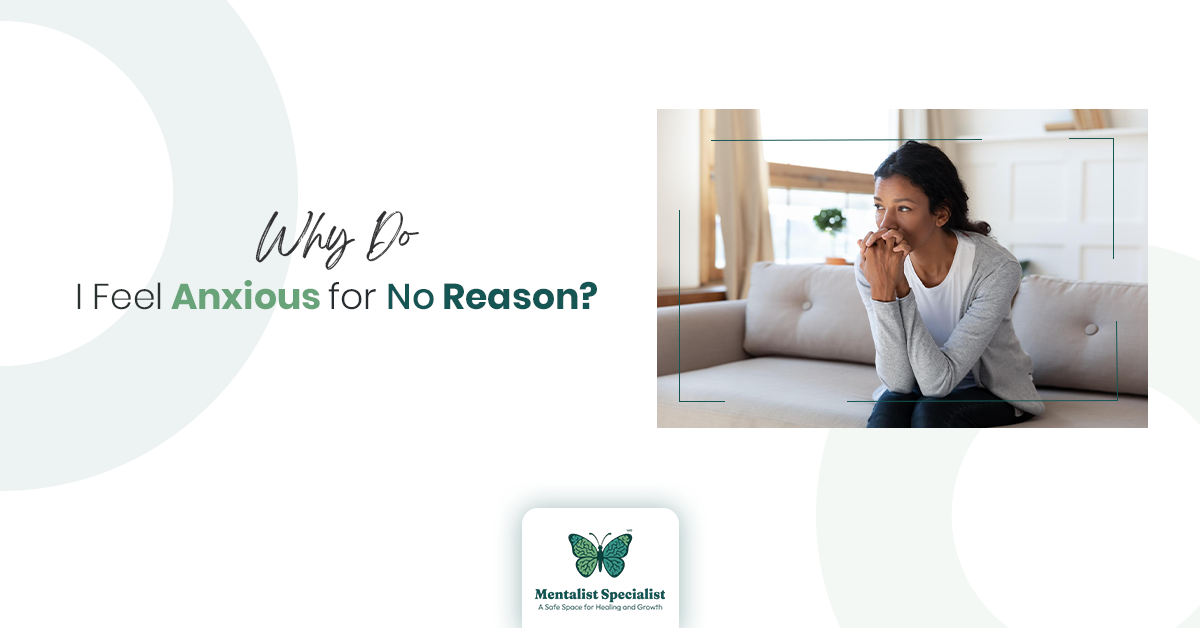Have you ever been sitting there, maybe sipping your morning tea, when suddenly your heart starts racing for seemingly no reason at all? Yeah, we’ve been there too.
Why Do I Feel Anxious for No Reason?
That sensation of anxiety that seems to just come out of thin air is not just that, it actually has a root.
Our bodies and minds are incredibly dynamic systems, and sometimes, they track signals we are not directly aware of.
What seems like “anxiety for no reason” is usually your body reacting to light cues that aren’t quite conscious to you yet.
Some hidden triggers can be these:
- Sleep issues – Even one night of poor sleep can elevate stress hormones
- Nutritional imbalances – That afternoon espresso might be lingering longer than you think
- Environmental aspects – Everything from subtle weather changes to background noise levels
- Subconscious processing – Your mind is working through issues even when you’re not actively thinking about them
That physical feeling? It’s real.
When anxiety hits unexpectedly, the physical sensations are absolutely real. Your body is entering a protective state:
- Your heart beats faster to pump a greater amount of blood to your muscles. You breathe faster in order to take more oxygen.
- Digestion slows down, and this is to use up energy to address more pressing issues.
These feelings aren’t something in your head – it’s your body doing precisely what it’s built to do. To realize this can be empowering to a great extent.
What you experience isn’t a malfunction; it is really your body’s intelligence at play (if only being a little too protective).
Simple ways to reset your system.
When those random anxiety waves show up, there are ways to communicate safety back to your nervous system:
- The 4-7-8 breath: Breathe in for 4 and hold for 7, and exhale for 8. This pattern tells your body you are safe enough to breathe slowly.
- Cold exposure: Splash cold water on your face or hold an ice cube in your hand. This temperature change helps break the anxiety cycle by giving your body a new sensation to process.
- Name it to tame it: Just identifying with the thought “I’m feeling anxious right now” can defuse it by up to 50%, cognitive research says. By labeling our emotions, we activate our prefrontal cortex and thereby help regulate emotional responses.
- Move your body: Even just a two-minute walk or stretching can help process the stress hormones that build up during anxiety.
The anxiety-gut connection.
Perhaps the most interesting thing emerging from anxiety research is deciphering the gut-brain link.
Your digestive system has its own neural network; it’s often referred to as the “second brain.”
It continually informs your main brain of what’s going on down in your gut.
With an unbalanced gut microbiome, the anxiety symptoms will pop up out of nowhere.
Nourishing your gut using fermented foods, high fiber vegetables, and avoiding inflammatory foods can build a basis for more stable moods.
Some of the practitioners now apply advanced testing of the microbiome to develop individualized protocols for alleviating anxiety through gut healing, an approach that demonstrates promising results.
Reframing “for no reason.”
Perhaps the most powerful shift is changing how we think about these experiences.
Rather than seeing anxiety as random or meaningless, consider it information – your body trying to communicate something important.
Sometimes it’s signaling that you need more rest. Other times, it’s highlighting that your body needs movement or nourishment.
And sometimes it’s simply processing emotions that you haven’t had time to feel consciously.
By approaching anxiety with curiosity instead of frustration, we change our relationship with these feelings and often reduce their intensity naturally.
Your body’s wisdom.
That seemingly random anxiety isn’t random at all — it’s body intelligence in action, even when the signals feel confusing.
By being taught how to work with those feelings instead of against them, you can have a more balanced relationship with your nervous system.
Anxiety is a common thing in human nature. That is when they become persistent or overpowering; that professional support may be helpful.
Get professional support.
At Mentalist Specialist LLC, we specialize in evidence-based approaches to understanding and transforming anxiety patterns.
Don’t let unexplained anxiety get in the way of enjoying your days. Book an appointment today and find out how different your relationship with anxiety can be.
FAQs
Can random anxiety be related to physical health issues?
Yes, anxiety can, among other things, be a symptom of thyroid imbalance, lack of vitamins, or even heart arrhythmia.
It’s never a bad idea to ask your healthcare professional if your anxiety symptoms are new or long-standing.
How can I tell the difference between normal anxiety and an anxiety disorder?
The normal kind of anxiety appears and disappears, responding to life’s challenges.
An anxiety disorder usually entails chronic concern that a disturbance occurs in daily performance for prolonged periods.
If anxiety is making an enormous difference in your life to the point of compromising your ability to lead a quality life, you need professional support.
Are there foods that can trigger anxiety?
Yes! Among their triggers can be:
- Caffeine
- Refined sugar
- Alcohol
- Food additives
Writing a food and mood journal will help you find your triggers.
Can childhood experiences cause “random” anxiety in adulthood?
Absolutely. Our nervous systems are developed based on early life experiences.
At other times, adult anxiety is linked to past patterns that we’re not even directly conscious of – which is why they can feel like coming from nowhere.



No comment